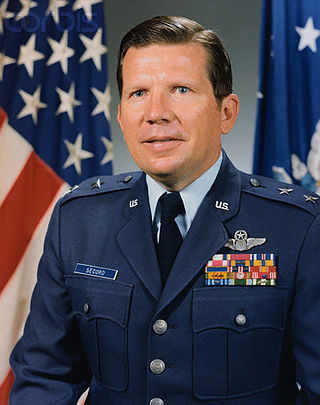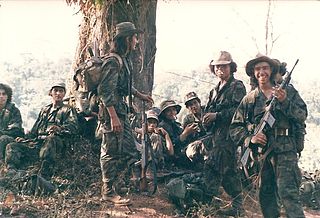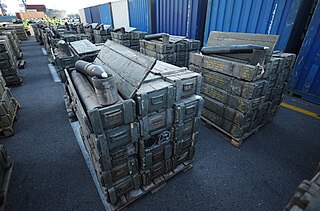Related Research Articles

The Iran–Contra affair, often referred to as the Iran–Contra scandal and more rarely as the Iran Initiative, was a political scandal in the United States that occurred during the second term of the Reagan administration. Between 1981 and 1986, senior administration officials secretly facilitated the illegal sale of arms to Iran, which was subject to an arms embargo at the time. The administration hoped to use the proceeds of the arms sale to fund the Contras, an anti-Sandinista rebel group in Nicaragua. Under the Boland Amendment, further funding of the Contras by legislative appropriations was prohibited by Congress, but the Reagan administration figured out a loophole by secretively using non-appropriated funds instead.

The Republic of Nicaragua v. The United States of America (1986) was a case where the International Court of Justice (ICJ) held that the U.S. had violated international law by supporting the Contras in their rebellion against the Sandinistas and by mining Nicaragua's harbors. The case was decided in favor of Nicaragua and against the United States with the awarding of reparations to Nicaragua.
Manucher Ghorbanifar is an expatriate Iranian arms dealer and former SAVAK agent.

Major General Richard Vernon Secord, Retired, is a United States Air Force officer with a notable career in covert operations. Early in his military service, he was a member of the first U.S. aviation detachment sent to the Vietnam War in August 1961, Operation Farm Gate. Secord left Vietnam in 1965 to attend Air Command and Staff College. Afterward, he returned to Southeast Asia, being detailed to the Central Intelligence Agency for duty in the Secret War in Laos. While in Laos, he was responsible for several notable military actions. One was the Battle of Lima Site 85. Another was the only successful prisoner of war rescue of the Vietnam War. Both of these came about because of his responsibilities for overseeing the operations of the Royal Lao Air Force, Air America, and Raven FACs.
Operation Charly, was allegedly the code-name given to a program during the 1970s and 1980s undertaken by the junta in Argentina with the objective of providing military and counterinsurgency assistance to right-wing dictatorships and insurgents in Central America. According to Noam Chomsky, the operation was either headed by the Argentine military with the agreement of the United States Department of Defense, or was led by the US and used the Argentinians as a proxy.

Military relations between Israel and the United States have been extremely close, reflecting shared security interests in the Middle East. Israel is designated as a major non-NATO ally by the U.S. government. A major purchaser and user of U.S. military equipment, Israel is also involved in the joint development of military technology and it regularly engages in joint military exercises with United States and other forces. The relationship has deepened gradually over time, though, as Alan Dowty puts it, it was "not a simple linear process of growing cooperation, but rather a series of tendentious bargaining situations with different strategic and political components in each."

CIA activities in Nicaragua were frequent in the late 20th century. The increasing influence gained by the Sandinista National Liberation Front, a left-wing and anti-imperialist political party in Nicaragua, led to a sharp decrease in Nicaragua–United States relations, particularly after the Nicaraguan Revolution. In 1981, President Ronald Reagan authorized the Central Intelligence Agency to support the Contras, a right-wing Nicaraguan political group to combat the influence held by the Sandinistas in the Nicaraguan government. Various anti-government rebels in Nicaragua were organized into the Nicaraguan Democratic Force, the first Contra group, at the behest of the CIA. The CIA also supplied the Contras with training and equipment, including materials related to torture and assassination. There have also been allegations that the CIA engaged in drug trafficking in Nicaragua.

Israel supported Iran during the Iran–Iraq War. Israel was one of the main suppliers of military equipment to Iran during the war. Israel also provided military instructors during the war, and in turn received Iranian intelligence that helped it carry out Operation Opera against Iraq's Osirak nuclear reactor. The nuclear reactor was a central component of Iraq's nuclear weapons program.

The MV Francop is a German-owned, Antigua and Barbuda-flagged merchant cargo ship. In November 2009 the Israeli navy boarded the vessel in the Mediterranean Sea, suspecting that it was carrying weapons destined for Hezbollah from the Islamic Republic of Iran in violation of United Nations Security Council Resolution 1701. Hundreds of tons of weapons were found on the ship, which was then directed to berth in Israel.

The Francop Affair was a high seas incident on November 4, 2009 in which the Israeli Navy seized the cargo ship MV Francop in the eastern Mediterranean Sea and its cargo of hundreds of tons of weapons allegedly bound from Iran to Hezbollah. The incident is also known by its military operation name, Operation Four Species.
Foreign Military Sales (FMS) is a security assistance program of the United States government to facilitate the purchase of U.S. arms, defense equipment, design and construction services, and military training to foreign governments. FMS is a government-to-government program where the United States Department of Defense through the Defense Security Cooperation Agency (DSCA) acquires defense articles on behalf of the foreign governments, protecting them from contract risks in negotiating with the arms industry and providing the contract benefits and protections that apply to U.S. military acquisitions. The FMS program was established through the 1976 Arms Export Control Act (AECA) and is overseen by the United States Department of State and the United States Congress through the annual Foreign Operations Appropriations Acts and National Defense Authorization Acts.

The Victoria Affair was a military operation conducted by the Israel Defense Forces (IDF) in March 2011 in which the Israeli Navy intercepted the vessel Victoria on the international waters in the Mediterranean, and discovered concealed weapons which, according to the IDF, were destined for Palestinian militant organizations in the Gaza Strip. The vessel was found to be carrying approximately 50 tons of weapons, including C-704 anti-ship missiles, rocket launchers, radar systems, mortar shells and rifle ammunition.
The Guns for Antigua scandal was a political scandal involving the shipment of Israeli-made weapons through Antigua to the Medellin drug cartel in Colombia. The affair was exposed by the Louis Blom-Cooper Royal Commission, following the discovery that several murders in Colombia had been perpetrated with Israeli guns that had been shipped through Antigua and were ostensibly for the Antigua and Barbuda Defence Force, which is equipped for free by the United States.
The defense industry of Israel is a strategically important sector and a large employer, as well as a major supplier of the Israel Defense Forces. The country is one of the world's major exporters of military equipment, accounting for 10% of the world total in 2007. Three Israeli companies were listed on the 2022 Stockholm International Peace Research Institute index of the world's top 100 arms-producing and military service companies: Elbit Systems, Israel Aerospace Industries and RAFAEL. It is also a major player in the global arms market with a 2.3% share of the global exports of major arms as of 2023. Total arms transfer agreements topped $12.9 billion between 2004 and 2011. There are over 150 active defense companies based in the country with combined revenues of more than $3.5 billion annually. Israeli defense equipment exports reached $7 billion in 2012, making it a 20 percent increase from the amount of defense-related exports in 2011. With the Russian invasion of Ukraine, arms exports reached $12.5 billion in 2022. Much of the exports are sold to the United States and Europe. Other major regions that purchase Israeli defense equipment include Southeast Asia and Latin America. India is also major country for Israeli arms exports and has remained Israel's largest arms market in the world.
Cyrus Hashemi was an Iranian arms dealer linked to the Iran-Contra affair, Brokers of Death arms case, and 1980 October Surprise theory. Robert Dreyfuss claimed Hashemi was a CIA and Mossad agent; Hashemi sued Dreyfuss and Lyndon LaRouche, whose Executive Intelligence Review had accused Hashemi of being linked to the alleged "funding of Iranian terrorism in the United States," with the case dismissed in June 1983 due to Hashemi's failure to respond to legal documents. Hashemi died from acute myeloblastic leukemia July 1986 in London.
Portugal's involvement in the Iran–Iraq War includes Portugal supplying both Iran and Iraq with arms, and playing a role in the Iran–Contra affair. From 1981 to 1986 75% of Portuguese arms exports went to the Middle East; most of it, directly or indirectly, to Iran or Iraq.
The Iran–Contra affair was a political scandal in the United States that came to light in November 1986. During the Reagan administration, senior administration officials secretly facilitated the sale of arms to Iran, the subject of an arms embargo. Some U.S. officials also hoped that the arms sales would secure the release of hostages and allow U.S. intelligence agencies to fund the Nicaraguan Contras. Under the Boland Amendment, further funding of the Contras by the government had been prohibited by Congress.
Paul S. Cutter, also known as Paul Sjeklocha born on October 9, 1937, in Iowa, USA, is an American publisher who was convicted by a US court of selling arms to Iran. He was described by The New York Times in 1987 as "a former American diplomatic official who had worked for the United States Information Agency in Moscow and served for 11 years as a researcher and translator for the Central Intelligence Agency".
Richard John Brenneke was an American businessman who testified in 1988 that he had worked in Southeast Asia with the Central Intelligence Agency's Air America, among other roles.

Operation Full Disclosure was a military operation carried out by the Israel Defense Forces on March 5, 2014, in the Red Sea. After days of surveillance far out to sea, Israeli Navy Shayetet 13 commandos seized the Iranian-owned and Panamanian-registered merchant vessel Klos C that had set sail from Iran, heading for Port Sudan via Iraq. On board, the commandos found long-range missiles suspected to be destined for the Gaza Strip concealed in containers full of Iranian bags marked as Portland cement. An unnamed senior Egyptian security official reportedly confirmed that the arms shipment was headed for militants in either Gaza or Sinai. A UN panel of experts concluded that the weapons came from Iran and were being sent to Sudan, accusing Iran of violating the arms embargo. United Nations Security Council Resolution 1929 authorizes states to seize items, including arms, that Iran is forbidden from exporting.
References
- 1 2 3 4 Amir Oren, Haaretz , 26 November 2010, The truth about Israel, Iran and 1980s U.S. arms deals
- 1 2 US v Oliver North
- ↑ William M. LeoGrande (2009), Our Own Backyard: The United States in Central America, 1977-1992 , University of North Carolina Press, p387
- ↑ James O`Shea and Douglas Frantz, Chicago Tribune , 17 November 1986, Israel Turns U.s. Aid Into Profit On Arms